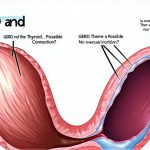The digestive system is often considered separate from other bodily functions, but it’s profoundly interconnected with nearly every aspect of our health – including thyroid function. The thyroid gland, responsible for producing hormones that regulate metabolism, plays a significant role in how efficiently we digest food, absorb nutrients, and eliminate waste. A disruption in thyroid hormone levels can significantly impact the entire digestive process, leading to a range of issues from constipation to nutrient deficiencies. Understanding this connection is crucial for recognizing potential imbalances and supporting overall well-being.
This article will explore the intricate relationship between thyroid function and digestion, outlining how both hypothyroidism (underactive thyroid) and hyperthyroidism (overactive thyroid) can affect various aspects of digestive health. We’ll examine specific symptoms related to these conditions, focusing on the mechanisms behind them and offering insights into supportive strategies – always in consultation with a healthcare professional.
The Thyroid’s Role in Metabolic Rate & Digestion
The thyroid gland produces hormones—primarily thyroxine (T4) and triiodothyronine (T3)—that regulate our metabolic rate. Metabolism isn’t just about weight; it encompasses all the chemical processes that occur within the body to maintain life, including digestion. A healthy metabolism ensures food is broken down efficiently, nutrients are absorbed properly, and waste products are eliminated effectively.
When thyroid hormone levels are imbalanced, this entire process can be compromised. Hypothyroidism slows down metabolic rate, while hyperthyroidism accelerates it, leading to markedly different digestive consequences. The speed at which the gut processes food, the production of digestive enzymes, and even the motility of the intestines are all influenced by thyroid hormones.
How Thyroid Imbalance Affects Digestive Processes
Thyroid disorders can manifest in a wide array of digestive symptoms because of their impact on several key areas. From altered gastric emptying to changes in intestinal motility, the effects are diverse and often overlooked as simple digestive issues rather than signs of an underlying thyroid condition. Recognizing these connections is vital for accurate diagnosis and appropriate management.
Hypothyroidism & Constipation
Hypothyroidism frequently leads to constipation due to a slowed metabolic rate which reduces gut motility—the muscular contractions that move food through the digestive tract. Less efficient peristalsis means it takes longer for waste to pass, leading to hardened stools and difficulty in elimination. This can also be compounded by reduced production of stomach acid, impacting initial stages of digestion.
Furthermore, hypothyroidism can affect the migrating motor complex (MMC), a series of electrical waves that sweep through the intestines during fasting, clearing out undigested food and bacteria. A sluggish MMC contributes to bacterial overgrowth and further digestive discomfort. Addressing thyroid hormone levels is often crucial in alleviating chronic constipation associated with hypothyroidism.
Hyperthyroidism & Diarrhea/Malabsorption
In contrast to hypothyroidism, hyperthyroidism typically accelerates gut motility. This can result in frequent bowel movements and even diarrhea as food passes through the intestines too quickly for proper absorption. While seemingly opposite of hypothyroidism’s effect, this rapid transit time hinders nutrient uptake.
The increased metabolic rate associated with hyperthyroidism also demands more nutrients, potentially exacerbating malabsorption issues. In some cases, individuals with hyperthyroidism may experience abdominal cramping and discomfort alongside diarrhea, making it difficult to maintain adequate hydration and nutrition.
Nutrient Absorption & Thyroid Function
Thyroid hormones are essential for the absorption of several key nutrients, including vitamin B12, iron, and fat-soluble vitamins (A, D, E, and K). Hypothyroidism can impair the production of intrinsic factor in the stomach, which is necessary for Vitamin B12 absorption. Low stomach acid also hinders iron absorption.
Hyperthyroidism may disrupt intestinal lining integrity, affecting overall nutrient uptake. Furthermore, individuals with thyroid imbalances often experience decreased appetite or altered dietary habits, further contributing to nutritional deficiencies. Ensuring adequate nutrition and addressing underlying thyroid conditions are crucial steps in supporting digestive health and overall wellness.
It’s important to remember that these connections are complex and can vary greatly from person to person. Digestive symptoms should always be evaluated by a healthcare professional to rule out other potential causes and determine the most appropriate course of action. This information is not intended to diagnose or treat any medical condition, but rather to provide a better understanding of the relationship between thyroid function and digestive health. Regular check-ups, balanced nutrition, and lifestyle adjustments can all contribute to optimal well-being, particularly for those with known or suspected thyroid issues.


















